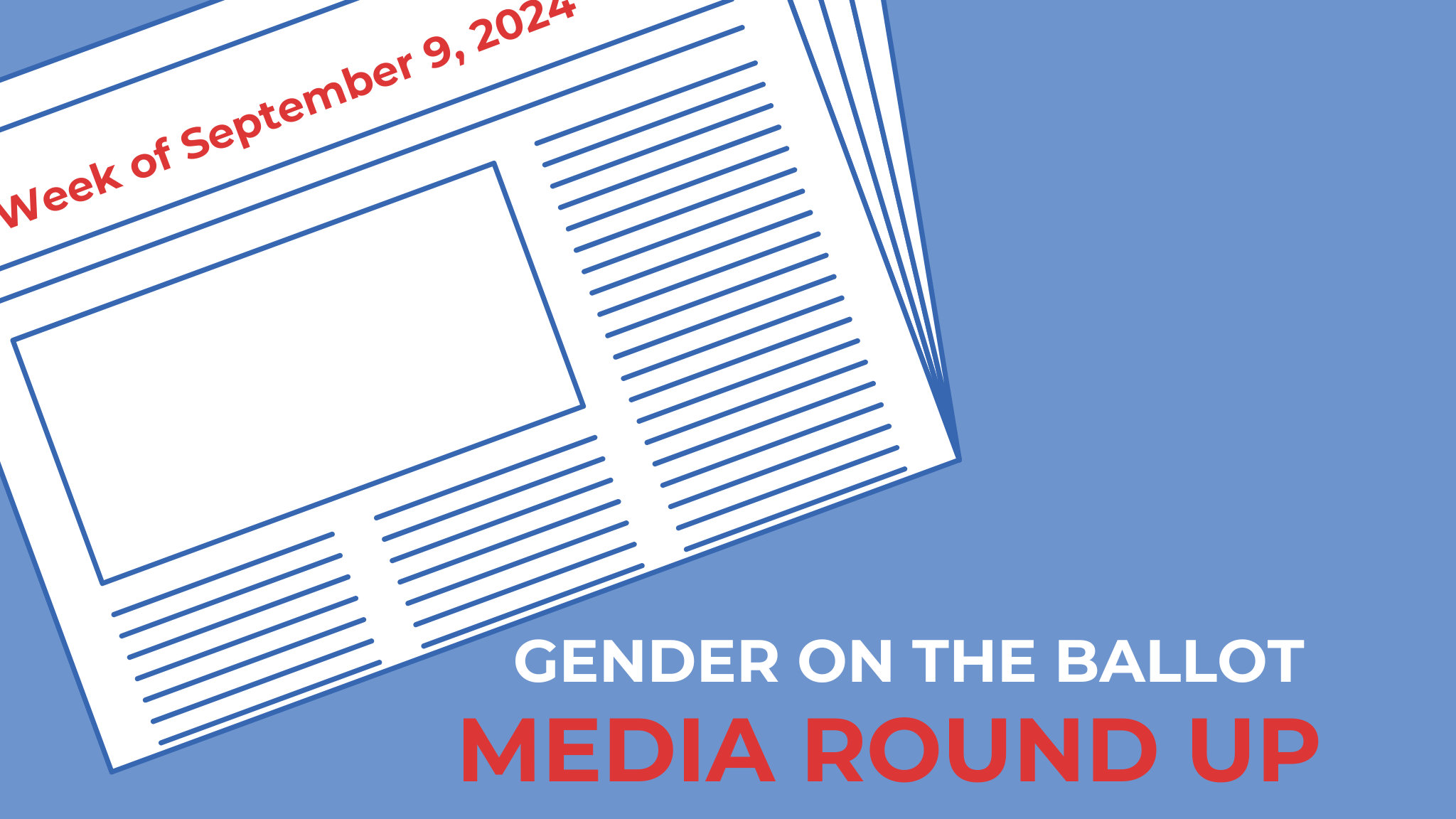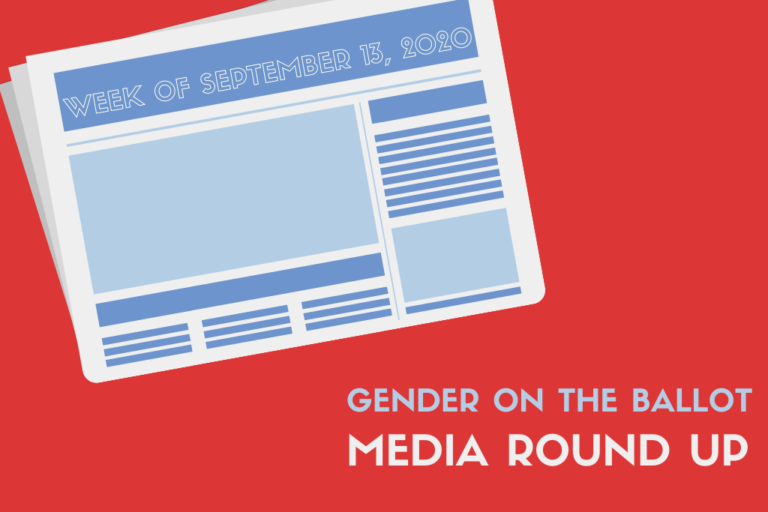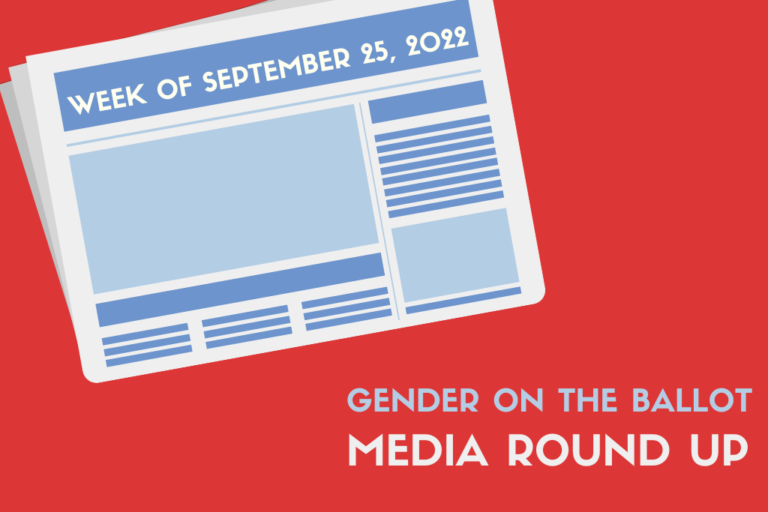Happy Friday! Welcome to our Media Round Up. Each week we’re collecting and sharing our…
Media Round Up: Week of September 9, 2024

Happy Friday! Welcome to our Media Round Up. Each week we’re collecting and sharing our favorite gender + politics stories.
Upending Gender Norms at the Debate
Following the presidential debate on Tuesday night between former President Donald Trump and Vice President Kamala Harris, pundits noted that Harris successfully baited Trump a number of times – and, in doing so, flipped a gender dynamic on its head. Harris – who, like other female elected officials, must work to combat the stereotype that women are too emotional to lead – triggered temperamental responses from Trump on subjects ranging from the size of his rally crowds and his reputation among world leaders, to his election loss in 2020 and the source of his fortune. In contrast to Trump, often defensive and combative on the debate stage, Harris “displayed a composure and tactical restraint that was palpable.” Early national polls conducted following the debate indicate that viewers think Harris had a better performance, even leading superstar Taylor Swift to release her hotly-anticipated endorsement of the Harris campaign late Tuesday evening. Though the effect of Swift’s backing is unknown, some speculate that her endorsement will especially motivate young women voters to cast their ballot in support of Harris this November.
Lt. Gov. Winsome Earle-Sears Announces Run For Virginia Governor
Royal Examiner, Virginia Mercury
On Thursday evening, Lt. Gov Winsome Earle-Sears (R) officially announced her candidacy for governor of Virginia in the upcoming 2025 election. Sears, who made history in 2022 by becoming the first Black woman in the commonwealth to hold statewide office, would become the nation’s first Black female governor if elected. Should she become the Republican nominee, she would likely face off against Rep. Abigail Spanberger (D), who announced her bid for the office back in November. This would mark the first time in Virginia’s history that two women competed against one another for the governor’s mansion.
McBride wins primary, clearing path to be first openly trans member of Congress
Washington Post, Jiselle Lee
AU Alumna Sarah McBride, SPA/BA ’13, won the Delaware Democratic primary for its upcoming U.S. House seat election. If elected, she would become the first transgender member of Congress. McBride is currently serving as senator of the 1st State Senate District in Delaware, where she made history in November 2020 as the country’s first transgender state senator. With securing almost 80% of the district’s Democratic vote, it’s an exciting time for the former AU student government president as she continues to make LGBTQ+ history.
2 Black women could make Senate history on Election Day
ABC News, Lisa Mascaro
The Senate has the potential to make history this fall, with two Black women possibly winning their elections to the chamber. If the two Democratic candidates – Rep. Lisa Blunt (D-DE) and Maryland’s Angela Alsobrooks – prevail in their races this November, it would double the number of Black women who have ever been elected to the Senate, from two to four. Two Black women have never served in the Senate together at the same time in the chamber’s history.
Kelly Ayotte and Joyce Craig to face off in New Hampshire governor’s race
NBC News, Adam Edelman
With just eight weeks until New Hampshire’s gubernatorial election, the race has come down to Republican Kelly Ayotte and Democrat Joyce Craig. Current Gov. Chris Sununu (R) is not seeking a fifth term, leaving the position open to a new candidate. Ayotte’s victory came as no surprise to many following the race, but it renews hope for the former U.S. Senator as she lost her re-election bid in 2016. Craig, however, was in a close race with New Hampshire Executive Council member Cinde Warmington. Maggie Goodlander, who previously worked with the Biden administration and the Justice Department, won the Democratic Primary in New Hampshire’s 2nd Congressional District after a tight race with Colin Van Ostern.
Justices Elena Kagan and Kentaji Brown Jackson Take to the Press
Justice Elena Kagan and Justice Kentaji Jackson spoke this week about the Supreme Court and Jackson’s new memoir, respectively. Kagan, speaking at NYU’s law school, reinforced her support for an enforceable ethics code for the Supreme Court following months of discussion surrounding the Justices’ ethical codes in and out of the Court. Kagan called it a “good idea”, echoing Jackson’s previous statement about being “open” to the idea. Jackson, who celebrates her birthday on September 14, has a new memoir just published titled “Lovely One.” It follows the story of her family’s life under segregation and her journey to becoming the first Black woman to serve as a Supreme Court Justice. Released on September 3, Jackson continues her book tour.
Missouri Supreme Court will allow abortion amendment on the ballot
The Hill, Nathaniel Weixel
Missouri voters will now have the chance to vote to protect abortion access in the upcoming November election after the state Supreme Court ruled in favor of adding the amendment. Missouri Secretary of State, Jay Ashcroft, decertified the measure from being on the ballot, but had to recertify it after the state Supreme Court ruled against a lower court’s decision that it could be removed. More than 380,000 people signed a petition to add the amendment that protects abortions until viability of the fetus, generally 24 weeks. In a post-Roe world, similar ballot measures are appearing in several state elections.
Don’t mention Trump – how Republicans try to sway women voters
BBC, Madeline Halpert
If there’s one thing this election cycle has taught us, it’s that women are not a monolith. As Republican women try to readjust their strategy to elect Former President Donald Trump, they focus on anything but him: the everyday topics like car payments, grocery store prices, and public safety. Another topic to avoid? Abortion. The divisiveness of Trump’s rhetoric and hot button issues are what drive women away. As Betsy Fischer Martin, executive director of the Women & Politics Institute, says, “These types of comments [“childless cat ladies who are miserable at their own lives”] do not help attract swing women voters…There are plenty of childless cat ladies voting in the suburbs.” For Republican hopefuls, the focus is on if they are better off under President Biden than Trump–without mentioning his name.
The Threat of the Comstock Act to Abortion Rights if Kamala Harris Loses
TIME, Rebecca DeWolf
WPI Instructor and AU Alumna Rebecca DeWolf, CAS/Ph.D ‘14, explores the history of the Comstock Act and considers how it could be reinforced under a Trump presidency. The Comstock Act is a nineteenth century law banning the mailing of any obscene material that was passed in response to what some saw as a rise in sexual radicalism and the erosion of traditional gender roles in the United States. It classified information concerning contraception and abortion as “obscene.” Since Congress never repealed it, DeWolf surmises that if elected, former President Donald Trump and his administration could interpret the Act to prosecute those who send or receive abortion-related materials to further undermine women’s reproductive rights.






